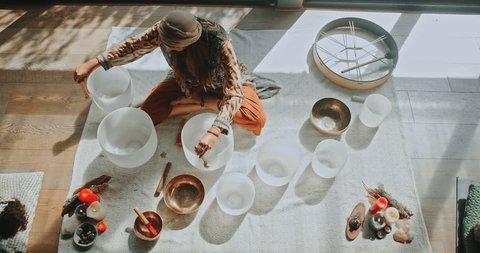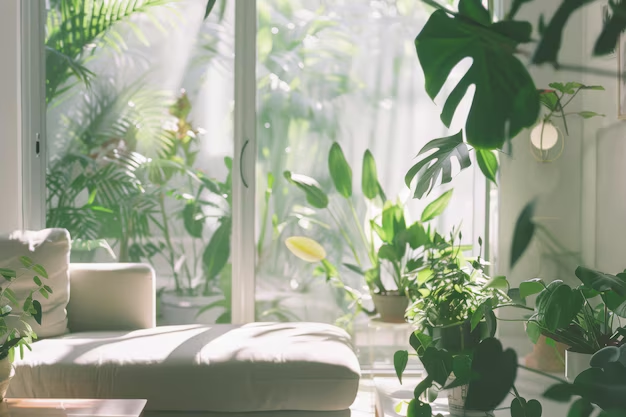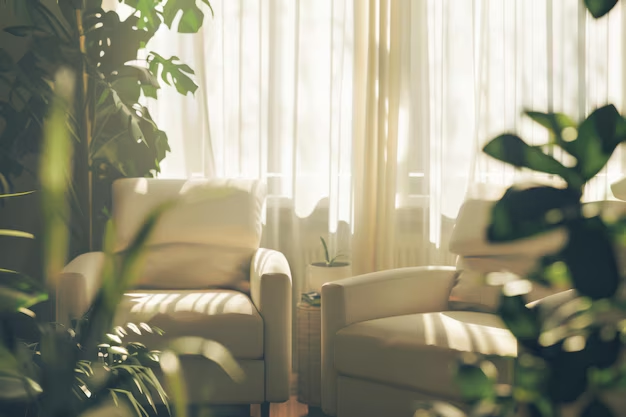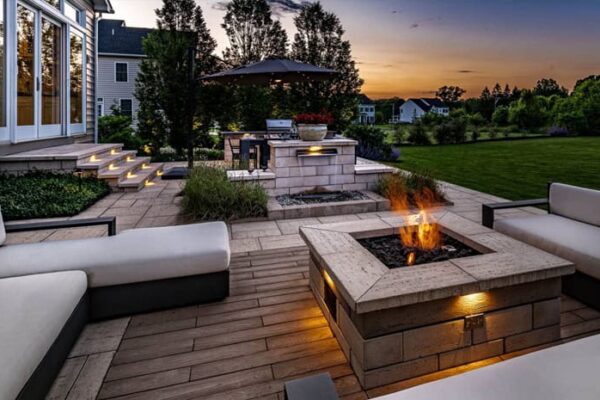
The Holistic Home: Integrating Aesthetics, Wellness, and Financial Savvy in Modern Decor
The New Philosophy of Home Decor: Beyond Simple Aesthetics
For decades, Home Decor was primarily viewed through a lens of aesthetics—a way to express personal style and create a visually pleasing environment. However, a significant shift is underway, transforming our understanding of what it means to decorate a home. Today, a more holistic approach is taking root, one that views our living spaces as integral components of our overall well-being. This modern philosophy intertwines Interior Design with principles of Health & Wellness, financial prudence, and environmental responsibility. It’s no longer just about the color on the walls or the style of the sofa; it’s about creating a sanctuary that supports our Mental Health, aligns with our financial goals, and reflects a commitment to Sustainable Living.
This evolution in thinking is a response to a confluence of global trends and changing personal values. The rise of Remote Work has blurred the lines between office and home, demanding spaces that foster both productivity and relaxation, directly impacting our Work-Life Balance. A growing awareness of our environmental footprint has propelled Eco-Friendly Living from a niche interest to a mainstream priority. Simultaneously, economic pressures have made homeowners more conscious of their spending, seeking decor solutions that offer long-term value and smart financial returns. This comprehensive approach recognizes that a well-designed home is a powerful tool for self-improvement, a cornerstone of a balanced lifestyle, and a smart personal investment. It’s about curating an environment that not only looks good but feels good, functions intelligently, and aligns with a deeper sense of purpose and responsibility.
Section 1: The Sustainable Sanctuary: Merging Eco-Friendly Design with Timeless Style
The movement towards sustainability has profoundly impacted the world of interior design, proving that style and environmental consciousness can coexist beautifully. Creating a sustainable home is about making intentional choices that reduce environmental impact without sacrificing aesthetic appeal. This approach encompasses everything from material selection and furniture sourcing to energy consumption and waste reduction, touching on principles of Green Living and Zero Waste.
Choosing Earth-Friendly Materials
The foundation of a sustainable interior lies in its materials. Instead of relying on virgin, resource-intensive products, consider alternatives that are renewable, recycled, or reclaimed.
- Reclaimed Wood: Sourced from old barns, factories, or dismantled structures, reclaimed wood brings history and character to floors, accent walls, and furniture. It prevents landfill waste and reduces the demand for new logging.
- Cork: Harvested from the bark of cork oak trees without harming the tree itself, cork is a sustainable choice for flooring and wall coverings. It’s naturally insulating, anti-microbial, and provides a comfortable surface underfoot.
- Recycled Materials: Look for countertops made from recycled glass, rugs woven from recycled plastic bottles (PET), or insulation made from recycled denim. These innovations in Technology for Home turn waste into beautiful, functional products.
- Low-VOC Paints: Volatile Organic Compounds (VOCs) are harmful chemicals released by traditional paints, impacting indoor air quality. Opting for low- or zero-VOC paints is a simple switch that significantly improves the Health & Wellness of your home environment.
* Bamboo: As a rapidly growing grass, bamboo is a highly renewable resource for flooring, furniture, and even textiles. It’s known for its durability and modern aesthetic.
The Power of Secondhand and DIY Projects
Embracing Sustainable Living also means changing how we acquire items. The thrill of the hunt at thrift stores, antique shops, and online marketplaces can yield unique, high-quality pieces with a story to tell. This practice not only saves money, aligning with Budget Tips, but also prevents furniture from ending up in landfills. Furthermore, engaging in DIY Projects is a cornerstone of sustainable decor. Refinishing an old dresser, reupholstering a vintage chair, or building shelves from salvaged materials can be a rewarding expression of creativity and a powerful act of consumption reduction. These hands-on activities can also be a form of Mindfulness, providing a break from digital screens and fostering a deeper connection to your living space.

Bringing Nature Indoors: Biophilic Design
A key element of eco-friendly decor is biophilic design—the practice of connecting people and nature within our built environments. This goes beyond simply owning a few houseplants. It’s about integrating natural light, patterns, textures, and living elements into your home. Incorporating extensive indoor plants is a great start, as it purifies the air and reduces stress. For those interested in Urban Gardening, a small indoor herb garden can be both decorative and functional for your Food & Cooking adventures. Effective Plant Care becomes a rewarding hobby that enhances your home’s vitality. This connection to nature is proven to boost mood and improve Mental Health.
Section 2: The Financial Blueprint: Smart Investments in Your Living Space
Decorating your home is an investment, not just an expense. A strategic approach to Home Improvement and decor can enhance your quality of life while also protecting and even increasing the financial value of your property. This requires careful Financial Planning and an understanding of which upgrades offer the best return on investment (ROI).
High-ROI Decor and Improvement Projects
While a complete gut renovation might not be feasible, several smaller, decor-focused projects can yield significant returns. According to various Investment News sources in the real estate sector, these updates are consistently valuable:
- A Fresh Coat of Paint: This is arguably the most cost-effective upgrade. Neutral, modern colors can make a space feel larger, brighter, and cleaner, appealing to a broad range of potential buyers.
- Lighting Upgrades: Swapping dated fixtures for modern, energy-efficient LED lighting can instantly update a room’s feel. A well-lit home feels more welcoming and spacious. Installing smart lighting is a Smart Home feature that adds convenience and appeal.
- Kitchen and Bathroom “Facelifts”: Instead of a full remodel, focus on smaller, high-impact changes. Refinishing cabinets, updating hardware, installing a new backsplash, or replacing an old vanity can transform a space for a fraction of the cost. These are key areas buyers focus on.
- Curb Appeal: Your home’s exterior is the first impression. Simple landscaping, a freshly painted front door, and updated house numbers are small investments that significantly boost perceived value. Good Gardening Tips can be a major financial asset here.
Budgeting for Beauty: Practical Financial Tips
Creating a beautiful home doesn’t require a massive budget. Smart financial habits are key.
- Create a Detailed Budget: Before starting any project, outline all potential costs, from paint and furniture to labor and a 10-15% contingency fund for unexpected issues. This is a core tenet of good Personal Finance.
- Phase Your Projects: Tackle one room or one project at a time. This makes the process more manageable financially and emotionally, preventing burnout.
- Mix High and Low: Invest in timeless, high-quality “anchor” pieces like a sofa or dining table, and save on trendy, decorative items like pillows, throws, and art from more affordable sources.
- Wait for Sales: Patience is a financial virtue. Plan your purchases around major holiday sales events to maximize your savings.
Section 3: Cultivating Well-being Through Intentional Design
Your home is the backdrop to your life; it should be a place of refuge, comfort, and rejuvenation. Intentional design choices can have a profound impact on your psychological and emotional state, directly influencing Stress Management, productivity, and overall happiness. This is where Interior Design meets Holistic Health.

The Psychology of Color and Light
Color is a powerful tool that can alter mood and perception. Cool colors like blues and greens tend to have a calming effect, making them ideal for bedrooms and spaces dedicated to Meditation or relaxation, ultimately contributing to better Sleep Health. Warm colors like yellows and oranges can evoke feelings of happiness and energy, suitable for kitchens or creative spaces. Natural light is equally crucial. Maximizing sunlight by using sheer curtains and strategically placed mirrors can boost mood and regulate circadian rhythms. A well-lit, organized home office, for example, is a key component of effective Productivity Tips for anyone in a Remote Work situation.
The Art of Decluttering and Organization
Clutter is a significant source of stress and anxiety. The principles of Minimalism and effective Home Organization are not just about having a tidy house; they are about creating mental clarity.
- The “One In, One Out” Rule: For every new item you bring into your home, let one go. This prevents the slow accumulation of clutter.
- Designated Homes: Every item should have a specific place. This simple habit, a core of many Organization Tips, makes tidying up quick and reduces the mental load of searching for things.
- Functional Furniture: Choose pieces that offer hidden storage, such as ottomans with lift-up tops or beds with built-in drawers.
A decluttered environment fosters a sense of control and peace, making it easier to practice Mindfulness in your daily life. This is a fundamental step in any Self-Improvement journey that starts at home.
Creating Zones for Life’s Activities
A well-designed home supports the diverse activities of modern Family Life. Creating distinct zones, even in an open-plan space, can improve function and harmony. Designate a comfortable reading nook for quiet moments, a dedicated and ergonomic workspace to maintain Work-Life Balance, a welcoming area for social gatherings, and a serene corner for a yoga mat or Meditation cushion. This thoughtful space planning ensures that your home adapts to your needs, from focused work to joyful Relationships and personal renewal.
Section 4: Best Practices and Recommendations for Your Decor Journey
Embarking on a home decor project can be exciting but also overwhelming. Following a few best practices can ensure a smoother, more successful process.
Pros of a Planned Approach vs. Cons of Impulsive Choices
A planned approach involves creating a mood board, setting a budget, and measuring your space before making any purchases. The pros are significant: a cohesive design, financial control, and fewer mistakes. Impulsive buying, while thrilling in the moment, often leads to a disjointed look, budget overruns, and “decorator’s remorse.” The key is to start with a clear vision for how you want the space to feel and function.
Recommendations for Getting Started
- Define Your Style: Spend time on platforms like Pinterest or in design magazines to identify what you’re drawn to. Are you a minimalist, a maximalist, or somewhere in between? Understanding your personal aesthetic is the first step.
- Start with One Room: Don’t try to overhaul your entire home at once. Pick one room—often the one you spend the most time in—and focus your energy and budget there. Success in one area will build momentum for the next.
- Test Everything: Before committing to a paint color, buy a sample pot and paint a large swatch on the wall. Before buying a sofa, if possible, sit on it. Live with your choices for a few days to see how they work in different light and at different times of day.
- Prioritize Functionality: A beautiful room that doesn’t work for your lifestyle will quickly become a source of frustration. Consider traffic flow, storage needs, and how your family, including pets (Pet Care), will use the space.
Conclusion: Your Home as a Reflection of Your Best Self
Modern Home Decor is a multifaceted discipline that extends far beyond surface-level beauty. It is a powerful practice of self-care and intentional living. By integrating the principles of sustainability, smart financial planning, and psychological well-being into our design choices, we can transform our homes into true sanctuaries. The holistic home is one that supports our health, reflects our values, and enhances our daily lives. It is an eco-conscious, financially savvy, and emotionally resonant space that nurtures our growth and provides a foundation for a balanced and fulfilling life. As you embark on your own decor journey, remember that the ultimate goal is to create a space that is a true and authentic reflection of your best self.
You may also like
Archives
- February 2026
- January 2026
- December 2025
- November 2025
- October 2025
- September 2025
- August 2025
- July 2025
- June 2025
- May 2025
- April 2025
- March 2025
- February 2025
- January 2024
- October 2023
- September 2023
- August 2023
- July 2023
- June 2023
- May 2023
- April 2023
- March 2023
- February 2023
- January 2023
- December 2022
- November 2022
- October 2022
- September 2022
- August 2022
- June 2022
- May 2022
- April 2022
- March 2022
- January 2022
- December 2021
- November 2021
- October 2021
- August 2021
- November 2020
- July 2020
- May 2020
- April 2020
- March 2020
- August 2018
- July 2018
- June 2018
- April 2018
- March 2018
Categories
- Aftercare Procedures
- Age Groups
- AI/ML
- Alternative Medicine
- Ambient Computing
- Animal Health
- Animal Husbandry
- Animals
- Anti-Aging
- Architectural Design
- Art And Technology
- Auditory Science
- Augmented Reality
- Automation
- Babies
- Baby
- Beauty & Skincare
- Beauty Industry
- Biohacking
- Biomechanics
- Book Reviews
- Breastfeeding
- Budgeting
- Budgeting Strategies
- Business
- Cardiovascular Health
- Career Advice
- Career Development
- Career Growth
- Cats
- Chess
- Chronobeauty
- Circular Economy
- Civic Technology
- Cleaning Tips
- Cloud Computing
- Cognitive Health
- Cognitive Performance
- Cognitive Science
- Community
- Community Building
- Community Engagement
- Community Living
- Computer Vision
- Consumer Guides
- Consumer Trends
- Container Gardening
- Content Analysis
- Content Non-Technical
- Content Strategy
- Cooking Techniques
- Cosmetic Chemistry
- Cultural Events
- Cycling
- Data Analysis
- Data Engineering
- Data Governance
- Data Science
- Database
- Design Psychology
- Design Trends
- Developer Productivity
- Diet
- Diet
- Diet And Nutrition
- Digital Identity
- Digital Media
- Digital Wellbeing
- DIY
- DIY Projects
- Dogs
- Engineering Culture
- Entertainment News
- Environmental Impact
- Environmental Science
- Equity Compensation
- Ethical AI
- Exercise
- Exercise Science
- Exercise Technique
- Exotic Pets
- Fall Gardening
- Family
- Family Health
- Family Life
- Fashion Business
- Fashion Industry
- Fashion News
- Fashion Tech
- Financial Analysis
- Financial Optimization
- Financial Planning
- Flooring Maintenance
- Food
- Food Psychology
- Food Safety
- Food Science
- Food Tech
- Functional Fitness
- Functional Training
- Future Of Work
- Garden Care
- Garden Maintenance
- Gardening Tips
- Geospatial Data
- Gig Economy
- Greece
- Greek
- Greek Food
- Green Technology
- Gymnastics
- Hardware Engineering
- Health
- Health And Wellness
- Health Informatics
- Health Science
- Health Tech
- Health Technology
- Healthcare
- Healthcare Management
- Healthy Eating
- Healthy Recipes
- Holistic Health
- Holistic Wellness
- Home & Living
- Home Decor
- Home Financing
- Home Health
- Home Improvement
- Home Maintenance
- Home Organization
- Home Styling
- Horticulture
- Household Chemistry
- Identity Management
- Indoor Gardening
- Industrial Design
- Industry Analysis
- Infant Nutrition
- Infrastructure Management
- Ingredient Deep Dive
- Integrative Health
- Integrative Medicine
- Interior Design
- Internet of Things
- Internet of Things (IoT)
- Invalid Request
- Investment Strategies
- Investment Strategy
- IoT
- Kids
- Leadership Development
- Learning Strategies
- Lifestyle
- Lifestyle Brands
- Lifestyle News
- Lifestyle Optimization
- Literary Criticism
- Literature
- Logistics Management
- Machine Learning
- Material Science
- Materials Science
- Meal Planning
- Media Analysis
- Meditation
- Mental Health
- Mental Performance
- Mental Wellness
- Miami
- Miami Food
- Mind And Body
- Minimalism
- Mobile Development
- Neuroscience
- No Applicable Categories
- Nursing
- Nutrition
- Nutrition News
- Open Source
- Operating Systems
- Operational Resilience
- Opinion
- Organization Tips
- Outdoor Living
- Over 40
- Over 50
- Over 60
- Parenting
- Parenting
- Parenting Strategies
- Performance
- Performance Optimization
- Personal Development
- Personal Finance
- Personal Growth
- Personal Productivity
- Pet Care
- Pet Safety
- Philosophy
- Plant Care
- Politics
- Product Formulation
- Productivity
- Productivity Engineering
- Protein
- Psychology
- Psychology of Space
- Quantified Self
- Reading Culture
- Real Estate Investment
- Recipes
- Regulatory Compliance
- Remote Work
- Renovation Planning
- Resource Management
- Respiratory Health
- Responsible Pet Ownership
- Retail Strategy
- Retail Technology
- Robotics
- Science
- Seafood
- Seasonal Gardening
- Security
- Sedentary Health
- Self-Care
- Skincare Science
- Skincare Trends
- Sleep
- Sleep Health
- Smart Home
- Smoothies
- Social Impact
- Soft Skills
- Soil Health
- Spatial Computing
- Spatial Design
- Stress Management
- Supplements
- Sustainability
- Sustainability Science
- Sustainable Engineering
- Sustainable Fashion
- Systems Engineering
- Tax Optimization
- Tax Strategy
- Tech Investment
- Technical Writing
- Testing
- Travel
- Travel News
- Travel Safety
- Travel Tips
- Trend Analysis
- Tropical Plants
- Uncategorized
- Urban Gardening
- Urban Planning
- User Experience
- Veggie
- Vietnam
- Virtual Events
- Volunteering
- Wealth Management
- Wearable Technology
- Web Development
- Wellness
- Wellness Technology
- Winter Gardening
- Work-Life Balance
- Workplace Culture
- Workspace Setup
- World
- Writing
- Writing Skills
- Year In Review
- Yoga
- Yoga News
- Zero Waste




Leave a Reply